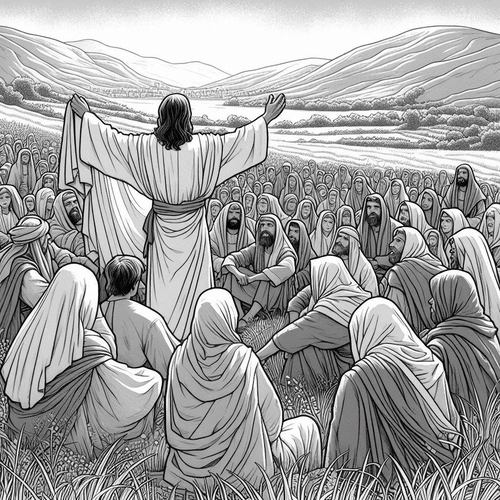Wisdom Personified: The Compelling View of Jesus in Proverbs 8
Lady Wisdom in Proverbs 8 declares “The Lord possessed me at the beginning of his work.” The chapter poses one of Scripture’s most fascinating theological puzzles. Is this mere poetic personification? Or could something deeper be at work? Perhaps, a pointer to Christ himself?
The Reformed tradition has long maintained Proverbs 8’s Wisdom figure ultimately points to Jesus Christ. The view, while challenged by some, creates remarkable theological coherence across Scripture. Let’s explore why this interpretation remains compelling, especially in light of contemporary scholarship.
WISDOM PERSONIFIED: MORE THAN A LITERARY DEVICE
Proverbs 1-9 introduces us to Lady Wisdom, who calls out in the streets and stands at the city gates. But nowhere is her portrait more striking than in chapter 8, where she claims divine prerogatives (Proverbs 8:22-24).
This isn’t merely clever poetry. Wisdom describes herself as:
- Present at creation
- Delighting the Lord daily
- Rejoicing in his inhabited world
- Delighting in mankind
These attributes transcend typical personification, suggesting an actual entity distinct from, yet intimately connected to, Yahweh himself.
THE CHRISTOLOGICAL CONNECTION: HOW JESUS FULFILLS WISDOM
The New Testament explicitly connects Christ with divine Wisdom in remarkable ways:
- “Christ the power of God and the wisdom of God” (1 Corinthians 1:24)
- “Christ, in whom are hidden all the treasures of wisdom and knowledge” (Colossians 2:2-3)
- “He was with God in the beginning. Through him all things were made…” (John 1:2-3)
Paul’s description of Christ in Colossians 1:15-17 mirrors Proverbs 8 with striking parallels: “He is the image of the invisible God, the firstborn over all creation. For in him all things were created… He is before all things, and in him all things hold together.”
Is this mere coincidence? The early church recognised these echoes, with Church Fathers like Justin Martyr and Athanasius identifying Christ with divine Wisdom.
Michael Heiser’s Fresh Perspective: Bible scholar Michael Heiser provides valuable insights that strengthen this connection. His work on the divine council and “the second power in heaven” demonstrates ancient Jewish thought accommodated plurality within monotheism.
Heiser shows Second Temple Judaism recognised a “second Yahweh” figure—one who was distinct from, yet shared the identity of Yahweh. This pattern appears throughout the Old Testament, where the “Angel of the Lord” sometimes speaks as God himself.
Wisdom in Proverbs 8 fits this pattern perfectly—a divine figure distinct from, yet sharing in God’s creative work. This conceptual framework makes Christ’s later identification as pre-existent Wisdom entirely coherent within Jewish theology.
ADDRESSING THE CHALLENGES
The Feminine Personification: The most obvious objection to identifying Wisdom with Christ is grammatical gender. How can feminine Wisdom represent the masculine Christ?
This objection misunderstands the nature of grammatical gender. In Hebrew, “wisdom” (ḥokmah) is grammatically feminine, requiring feminine pronouns and verb forms when personified—much like boats are “she” in English regardless of ownership.
Scripture itself often employs feminine imagery for God:
- God as a mother eagle (Deuteronomy 32:11)
- God giving birth (Deuteronomy 32:18)
- God as a mother comforting her child (Isaiah 66:13)
The feminine metaphors don’t compromise God’s transcendence of human gender categories. Similarly, Wisdom’s femininity doesn’t prevent her from prefiguring Christ.
The “Created” Language Problem: Proverbs 8:22 says Wisdom was “possessed” or “created” (depending on translation) by the Lord. This verse in fact, became central to the Arian controversy, with Arius arguing it proved Christ was created.
The key Hebrew word here, qanah, can and does mean “to create,” but more often means “to acquire” or “to possess.” Throughout the Old Testament, it frequently describes acquiring something already existing rather than creating something new.
Even if we accept “created” as the translation, we must understand this within Wisdom literature’s poetic framework. Athanasius argued this refers to Christ taking on created human form in anticipation of the incarnation—not to his eternal divine nature.
Alternative Interpretations: Some suggest Wisdom is:
- Merely a literary device with no ontological reality
- A created being (perhaps angelic)
- Simply an abstract divine attribute
While these views address specific challenges, they fail to explain the New Testament’s explicit connection between Christ and Wisdom. They also create unnecessary discontinuity between the testaments.
WISDOM PERSONIFIED: WHY THE REFORMED VIEW MAKES BETTER SENSE
The Reformed Christological reading of Proverbs 8 offers several distinct advantages:
- Theological Coherence: It creates unity between Old and New Testament revelation, showing God’s consistent self-disclosure.
- Biblical Intertextuality: It recognises the clear Wisdom echoes in New Testament Christology, especially in John’s Gospel and Paul’s letters.
- Trinitarian Framework: It highlights pre-incarnate Christ’s relationship with the Father, enriching our understanding of eternal Trinitarian relations.
- Redemptive History: It shows how God prepared conceptual categories within Israel’s understanding that would later help explain Christ’s divine identity.
- Practical Application: It invites us to seek Christ as the embodiment of wisdom itself, uniting intellectual understanding with saving faith.
CONCLUSION: WISDOM PERSONIFIED IS CHRIST HIMSELF
When read through the lens of progressive revelation, Proverbs 8 emerges as a profound glimpse of Christ before His incarnation. Lady Wisdom—present at creation, delighting in humanity, calling people to the knowledge of God—foreshadows Jesus who’d later declare, “I am the way, the truth, and the life.”
The feminine personification doesn’t diminish the connection but enriches it, demonstrating how God’s self-revelation transcends human categories while using them to communicate divine truth.
In Christ, we find Wisdom incarnate—not merely abstract knowledge, but the living Word who was “in the beginning with God.” When we pursue wisdom as Scripture commands, we’re ultimately pursuing Christ himself, in whom are hidden “all the treasures of wisdom and knowledge.”
WISDOM PERSONIFIED: RELATED FAQs
How does the Wisdom-Christ connection in Proverbs 8 relate to the doctrine of the Trinity? Reformed theologian Herman Bavinck argues Proverbs 8 reveals the “economic Trinity” at work before creation—showing distinctions within God’s nature, even prior to engaging with the created order. While Proverbs 8 primarily illuminates the pre-incarnate Son, it also implies the eternal relationship between Father and Son that is essential to the Trinitarian doctrine. This text helps us understand the Trinity isn’t merely a New Testament development, but is embedded within the very fabric of Old Testament revelation.
- Where do we see the Holy Spirit in the accommodated plurality of 2nd Temple Judaism? Michael Heiser and other scholars believed the “second power” in Second Temple Judaism correlates clearly to the Son. But the Spirit appears more subtly as God’s personal presence or “divine effluence” that interacts with creation. The Spirit in Second Temple texts often appears as God’s transformative power (ruach) that brings revelation, empowerment, and divine presence, functioning as what Richard Bauckham calls “divine agency without compromising divine identity.” Sinclair Ferguson notes the progressive revelation of the Spirit throughout Scripture follows a pattern where the Spirit’s distinct personhood becomes increasingly clear, culminating in Jesus’ teaching about the Paraclete—our divine Advisor and Counsellor.
- How does John Calvin specifically interpret Proverbs 8’s Wisdom figure? Calvin understood Wisdom in Proverbs 8 as the eternal Word of God, arguing this wasn’t merely a divine attribute but the second person of the Trinity. In his Institutes, Calvin writes this Wisdom is “begotten before all time” and represents the “ordered disposition of all things as they exist in God.” In particular, Calvin insisted Proverbs 8:22 should not be understood as saying Christ was created (which would make Him a creature rather than God). Instead, Calvin affirmed Christ is eternally generated from the Father—always existing in relationship with the Father, never coming into being at a point in time.
- How does Wisdom’s role in Proverbs 8 compare to ancient Near Eastern goddess figures? Unlike Mesopotamian wisdom goddesses like Inanna or the Egyptian Maat, Proverbs’ Wisdom is never presented as an independent deity but always as an extension of Yahweh’s character and activity. Reformed Old Testament scholar Bruce Waltke demonstrates that while borrowing literary conventions from surrounding cultures, biblical Wisdom literature radically transforms these concepts by integrating them into strict monotheism.
- What does Proverbs 8 contribute to our understanding of Christ’s mediatorial role? Richard Gaffin and other Reformed scholars point to Wisdom’s role in creation as prefiguring Christ’s cosmic mediatorship described in Colossians 1:15-20. Wisdom “rejoicing in his inhabited world” (Proverbs 8:31) anticipates Christ’s mediatorial delight in bringing “many sons to glory” (Hebrews 2:10). This connection reinforces the Reformed emphasis that Christ’s mediatorship isn’t merely a response to sin but part of God’s eternal purpose for creation, revealing what theologian Michael Horton calls the “eschatological orientation” of creation itself.
- How does the Christ-Wisdom connection influence our approach to knowledge and education? Reformed thinkers like Abraham Kuyper and Herman Dooyeweerd argue that if Christ is the embodiment of divine Wisdom, then all true knowledge ultimately relates to and finds its coherence in him. The theological foundation supports the Reformed concept of “sphere sovereignty” where all domains of knowledge (science, art, politics) have their own integrity while ultimately cohering in Christ. As Kevin Vanhoozer puts it, “The light of Christ as Wisdom illuminates every field of human inquiry, challenging the secular/sacred divide.”
- How do we reconcile Wisdom’s call in the streets (Proverbs 1:20-33) with reformed doctrines of election and effectual calling? Reformed theologians distinguish between Wisdom’s “general call” to all people and the Spirit’s “effectual call” to the elect. Charles Spurgeon and Jonathan Edwards both taught Wisdom’s public invitation represents genuine divine desire for human flourishing while maintaining that only God’s sovereign grace enables a saving response. This apparent tension exemplifies the “free offer of the gospel”—a genuine invitation extended to all while acknowledging that only those spiritually regenerated can ultimately respond.
WISDOM PERSONIFIED: OUR RELATED POSTS
- Types of Christ and His Cross in the Old Testament
- A Prophet Like Moses: How Jesus Fulfilled the Deuteronomy 18 Test
- Who Is Isaiah 53’s Suffering Servant: The Messiah or Israel?
- How the Torah Points to Christ: Prophecies, Patterns, Promises…
- The Tabernacle: How Does It Point to Christ’s Incarnation?
- Types of Christ and His Cross in the Old Testament
- Jesus in the Old Testament: Glimpses of the Coming Saviour
- Jesus in the Jewish Festivals: From Shadow to Substance
Editor's Pick

The Throne-Room Vision: Who Did Isaiah See?
The scene is unforgettable: Isaiah stands in the temple, and suddenly the veil between heaven and earth tears open. He [...]

The Angel of the Lord: Can We Be Certain It Was Christ All Along?
Throughout the Old Testament, a mysterious figure appears: the Angel of the LORD. He speaks as God, bears God’s name, [...]
SUPPORT US:
Feel the Holy Spirit's gentle nudge to partner with us?
Donate Online:
Account Name: TRUTHS TO DIE FOR FOUNDATION
Account Number: 10243565459
Bank IFSC: IDFB0043391
Bank Name: IDFC FIRST BANK






